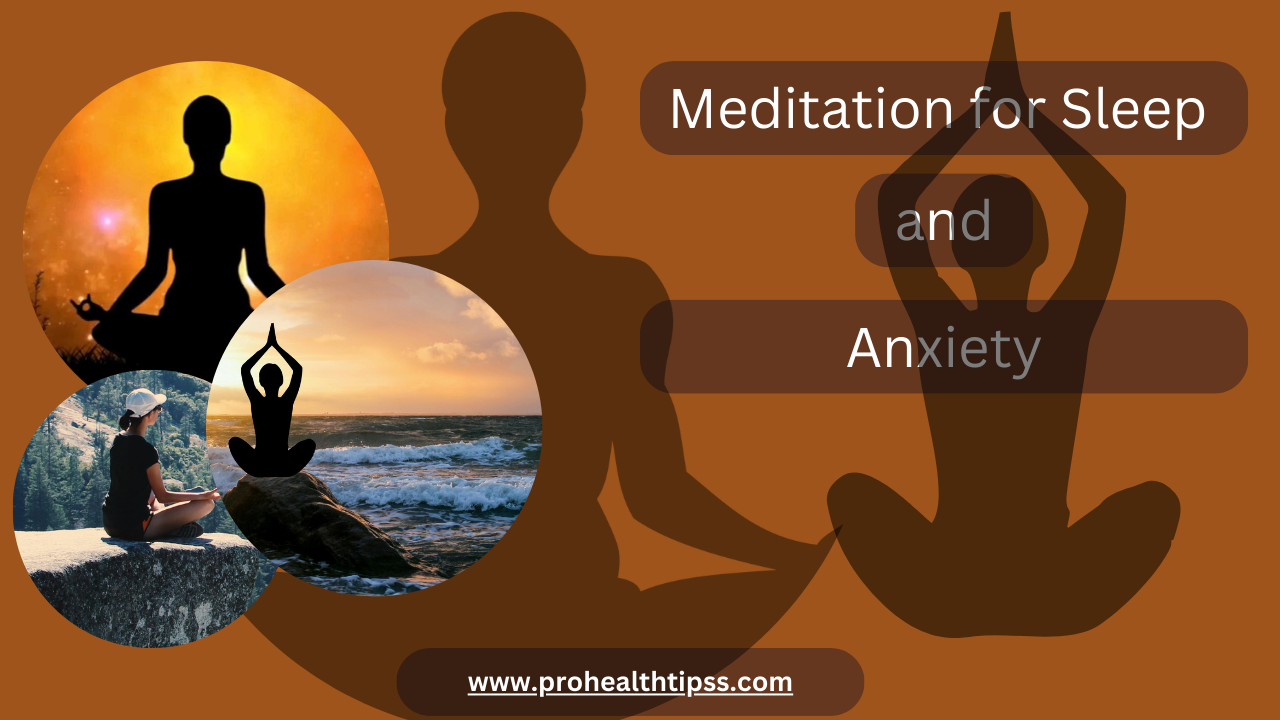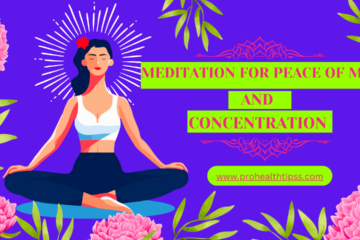Meditation for Sleep and Anxiety
Meditation tailored for sleep and anxiety serves as a comforting refuge for the restless mind. During moments of tranquility marked by deep, intentional breaths and guided visualization, the overwhelming waves of stress gently subside. Envision a serene mental landscape, a haven where concerns disperse like morning mist. With each breath following a harmonious rhythm, drawing in serenity and releasing tension, the body discovers solace in the immediate present. This process entails a purposeful letting go, a mindful surrender to the enveloping stillness that alleviates the hold of anxiety. Within this mental space, gratitude emerges as a guiding light, casting illumination on the positive aspects woven into the fabric of one’s life.

What is Meditation for Sleep and Anxiety?
Meditation for sleep and anxiety is a gentle yet powerful practice aimed at promoting a sense of calmness and tranquility, facilitating a restful night’s sleep and alleviating anxiety. This mindfulness technique involves focusing the mind on the present moment, often through guided breathing exercises or visualization. By redirecting attention away from racing thoughts and stressors, meditation helps create a mental environment conducive to relaxation. It not only cultivates a peaceful mindset but also encourages a physiological shift, promoting the release of tension and stress from the body. Incorporating meditation into a bedtime routine can be an effective tool for those seeking a natural and holistic approach to managing sleep issues and anxiety, fostering a deeper sense of well-being.
How to Meditate for Sleep and Anxiety?
Embarking on a journey to meditate for sleep and anxiety involves creating a serene ritual that gently guides both mind and body into a state of peaceful surrender. Begin by finding a quiet space, free from distractions, and assume a comfortable position. Focus on your breath, allowing it to become a rhythmic anchor in the present moment. Introduce calming visualizations, perhaps picturing a tranquil scene or envisioning stress dissolving like mist. Embrace each inhale as an invitation to serenity and exhale as a release of tension. This intentional practice not only eases the grip of anxiety but also lays the foundation for a restful night’s sleep.
How it’s Help for Sleep and Anxiety?
Embarking on a journey of meditation specifically designed to address sleep and anxiety proves to be a transformative experience. By engaging in intentional breathwork and guided visualizations, the mind finds a sanctuary where the relentless grip of anxiety loosens. This practice encourages a deliberate release, fostering a state of stillness that eases the restless mind. The rhythmic dance of the breath, inhaling tranquility and exhaling tension, becomes a powerful tool in promoting relaxation. Through this process, the body discovers solace in the present moment, paving the way for a more peaceful transition into sleep.
Benefits of Meditation for Sleep and Anxiety
As the mind engages in the calming rhythm of deep breaths and mindful stillness, the anxious whispers fade away. Meditation becomes a powerful ally in the quest for restful sleep, creating a haven where the stresses of the day unravel. The practice cultivates a heightened sense of awareness, allowing individuals to detach from the grip of anxiety and embrace a tranquil state of being. With consistent meditation, a profound shift occurs, fostering a peaceful mindset that extends into the night, promoting deeper sleep and waking up rejuvenated, ready to face the day with newfound resilience.
Meditation Reduce Sleep and Anxiety
Engaging in meditation has proven to be a powerful ally in reducing both sleep disturbances and anxiety. As individuals embrace moments of mindfulness, the practice acts as a gentle balm for the restless mind, gradually calming the waves of stress that may hinder restful sleep. Through focused breathing and intentional relaxation, meditation cultivates a mental haven where anxious thoughts dissipate. The rhythmic dance of breath becomes a conduit for serenity, easing the grip of anxiety and promoting a sense of peace in the present moment. This holistic approach to well-being underscores the profound connection between the mind and restful sleep, offering a natural and effective solution for those seeking a quieter, more tranquil night’s rest.Read More Does Meditation Help Anxiety and Depression Click Here
How Meditation Relaxed Body?
Meditation, a mindful journey inward, acts as a gentle balm for the body, unwinding the knots of tension and stress that accumulate in our daily lives. As we engage in the rhythmic dance of breath and stillness, a profound sense of relaxation cascades through each muscle and fiber. The breath becomes a conduit for release, exhaling the burdens carried by the body. With each inhale, a wave of calm sweeps over, soothing the nervous system and inviting a serene reprieve. In the quietude of meditation, the body finds a tranquil haven, a sanctuary where the demands of the external world gradually fade, leaving behind a rejuvenated and relaxed essence.
Listen Relaxation Music Click Here
Meditation Calm the Mind
Meditation, a gentle voyage into stillness, has the profound ability to calm the mind amidst life’s bustling symphony. In the quietude of focused breaths and mindful awareness, the turbulence of thoughts begins to settle. Like a serene lake mirroring the tranquil sky, meditation allows the mind to find its natural equilibrium. With each moment of presence, worries gently dissipate, creating space for clarity and peace. It is a sacred pause, an intentional embrace of the present, where the rhythm of breath becomes a guide back to serenity. Through the art of meditation, the mind discovers its own sanctuary—a place of quiet strength and resilience in the midst of life’s storms.
PROHEALTHTIPSS Suggesion
Meditation for sleep and anxiety is a gentle yet powerful practice aimed at promoting a sense of calmness and tranquility, facilitating a restful night’s sleep and alleviating anxiety. This mindfulness technique involves focusing the mind on the present moment, often through guided breathing exercises or visualization. By redirecting attention away from racing thoughts and stressors, meditation helps create a mental environment conducive to relaxation. It not only cultivates a peaceful mindset but also encourages a physiological shift, promoting the release of tension and stress from the body. Incorporating meditation into a bedtime routine can be an effective tool for those seeking a natural and holistic approach to managing sleep issues and anxiety, fostering a deeper sense of well-being.
Conclusion
Embracing meditation as a tool for managing sleep and anxiety yields profound benefits for both the mind and body. Through the gentle art of mindfulness, individuals can cultivate a serene mental space, untangling the knots of stress and worry that often accompany the hustle and bustle of modern life. By weaving moments of stillness into the fabric of our daily routines, we invite tranquility to settle in, fostering a more restful sleep and a calmer waking state. The power of meditation lies not only in its accessibility but also in its capacity to serve as a holistic remedy, addressing the intricate interplay between sleep and anxiety.





Wow, awesome blog structure! How long have you been blogging
for? you made running a blog look easy. The whole glance of your website is magnificent, as well as the content material!
You can see similar: e-commerce and here sklep online